The article presents ten effective strategies for hotel operations consulting, emphasizing the enhancement of revenue management, the improvement of decision-making through data analytics, the optimization of guest booking experiences, and the fostering of operational efficiency. Each strategy is substantiated by evidence that highlights its impact on occupancy rates, customer satisfaction, and overall profitability. This illustrates how a comprehensive approach to hotel management can lead to sustained success in a competitive market.
In the competitive landscape of the hospitality industry, effective hotel operations consulting has emerged as a crucial factor for success. By implementing innovative strategies, hotels can optimize their operational efficiency, enhance guest experiences, and drive revenue growth. However, with the rapid evolution of market demands and consumer behavior, hotel managers face the challenge of navigating these complexities to ensure sustained profitability and customer satisfaction.
This article explores ten pivotal strategies designed to revolutionize hotel operations, offering insights that empower establishments to thrive in an ever-changing environment.
Lights On employs advanced revenue management techniques that focus on pricing optimization and demand generation, complemented by effective accommodation marketing strategies. By examining market trends and consumer behavior, establishments can dynamically modify their pricing strategies while executing targeted marketing campaigns to attract potential visitors. Notably, properties that have adopted these strategies have experienced occupancy rate increases of up to 15%. This clearly demonstrates the effectiveness of . Furthermore, this dual approach ensures competitiveness and maximizes revenue, ultimately enhancing overall profitability by effectively reaching the right audience.
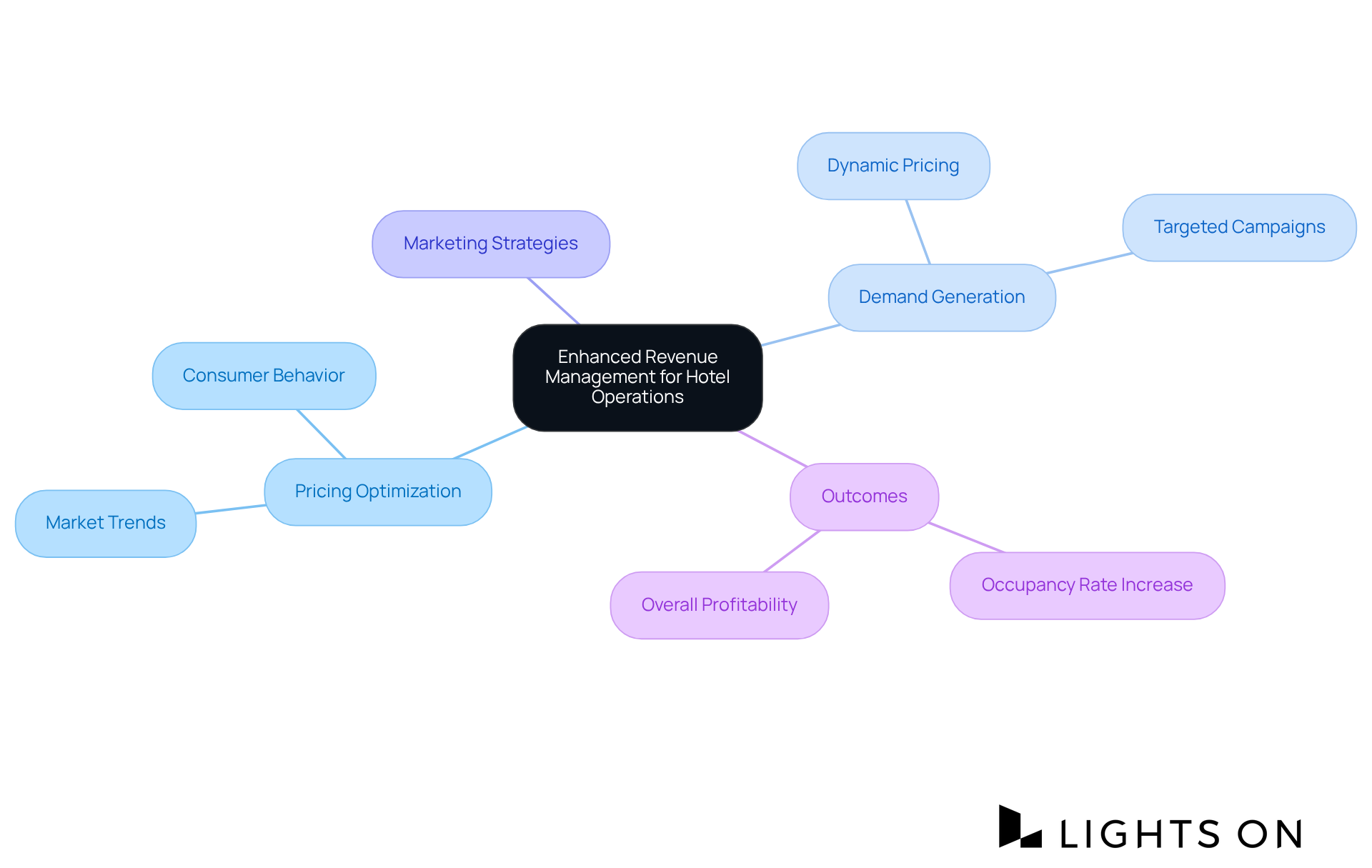
Data analytics empowers accommodations to uncover critical insights into visitor preferences, booking habits, and overall operational performance. By implementing a comprehensive data management system, accommodation providers can adeptly monitor key performance indicators (KPIs) such as:
This enables establishments to make informed decisions that enhance service delivery and operational efficiency. For instance, accommodations utilizing advanced revenue management systems can dynamically adjust pricing based on real-time demand, optimizing revenue streams in the process.
Moreover, the execution of effective accommodation marketing strategies—such as targeted email campaigns, social media promotions, and loyalty programs—can significantly elevate bookings by reaching the right audience with tailored promotions. The ability to analyze visitor feedback and behavior allows accommodations to refine their marketing strategies, ensuring a customized experience that aligns with evolving market demands. Consequently, accommodations can swiftly adapt to shifts in consumer preferences, ultimately boosting visitor satisfaction and fostering loyalty.
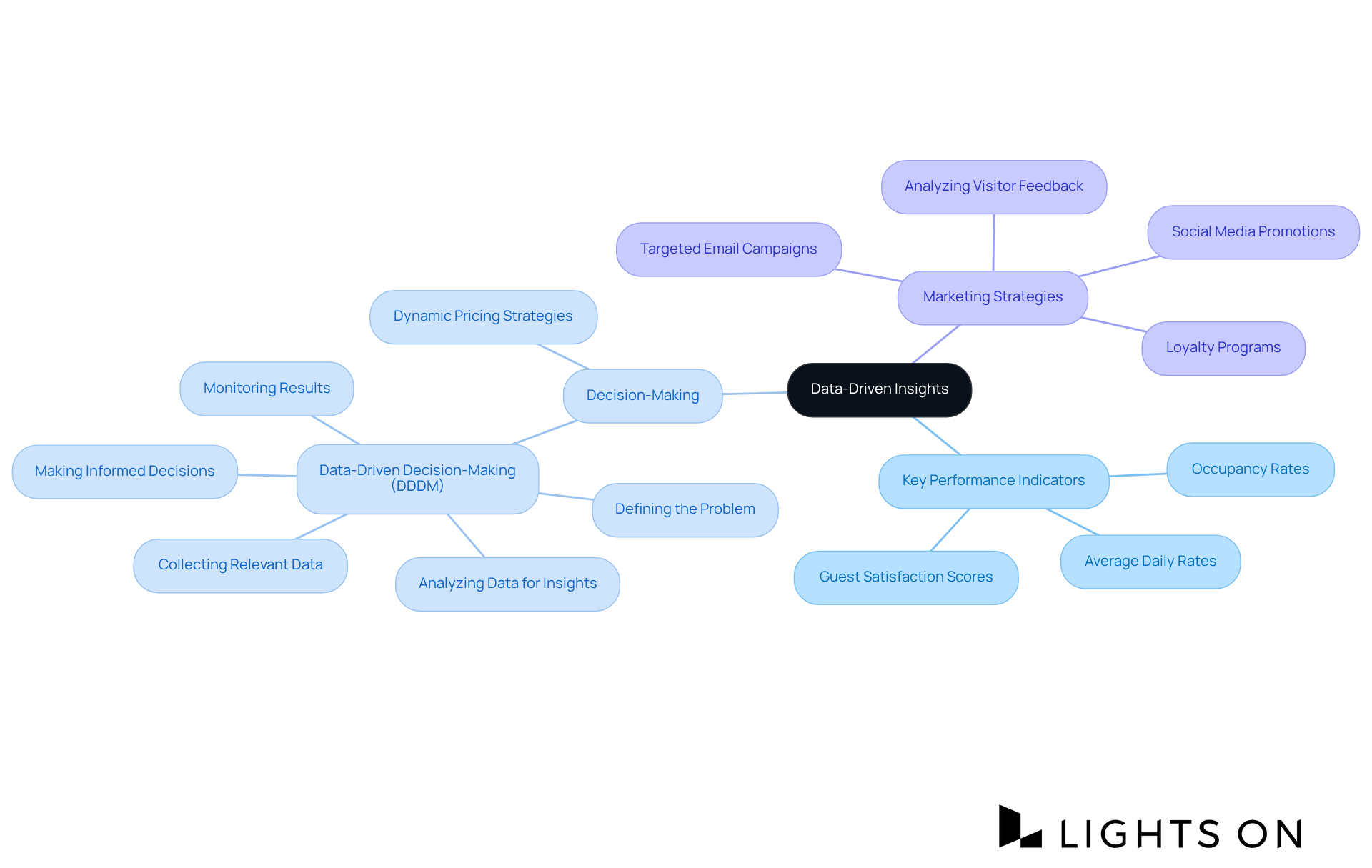
To enhance customer satisfaction, hotels must prioritize the . Establishing user-friendly online reservation systems is essential, as these platforms significantly reduce friction and improve the visitor experience. Furthermore, implementing targeted marketing strategies—such as customized email campaigns and social media advertising—can attract more visitors and boost reservations. Flexible payment options further enhance convenience, allowing guests to select methods that align with their preferences. Clear communication throughout the reservation journey is vital; it sets expectations and builds trust. By refining these elements and integrating effective marketing tactics, hotels can not only elevate conversion rates but also create a positive first impression that encourages repeat visits. A seamless reservation experience is increasingly recognized as a critical factor in guest loyalty, with research indicating that 72% of travelers prioritize superior guest review ratings over brand reputation or lower rates when selecting accommodations. Thus, investing in an optimized booking process, alongside strategic marketing initiatives, is not merely a technical enhancement; it represents a strategic move that fosters lasting customer relationships and enhances financial performance through hotel operations consulting.
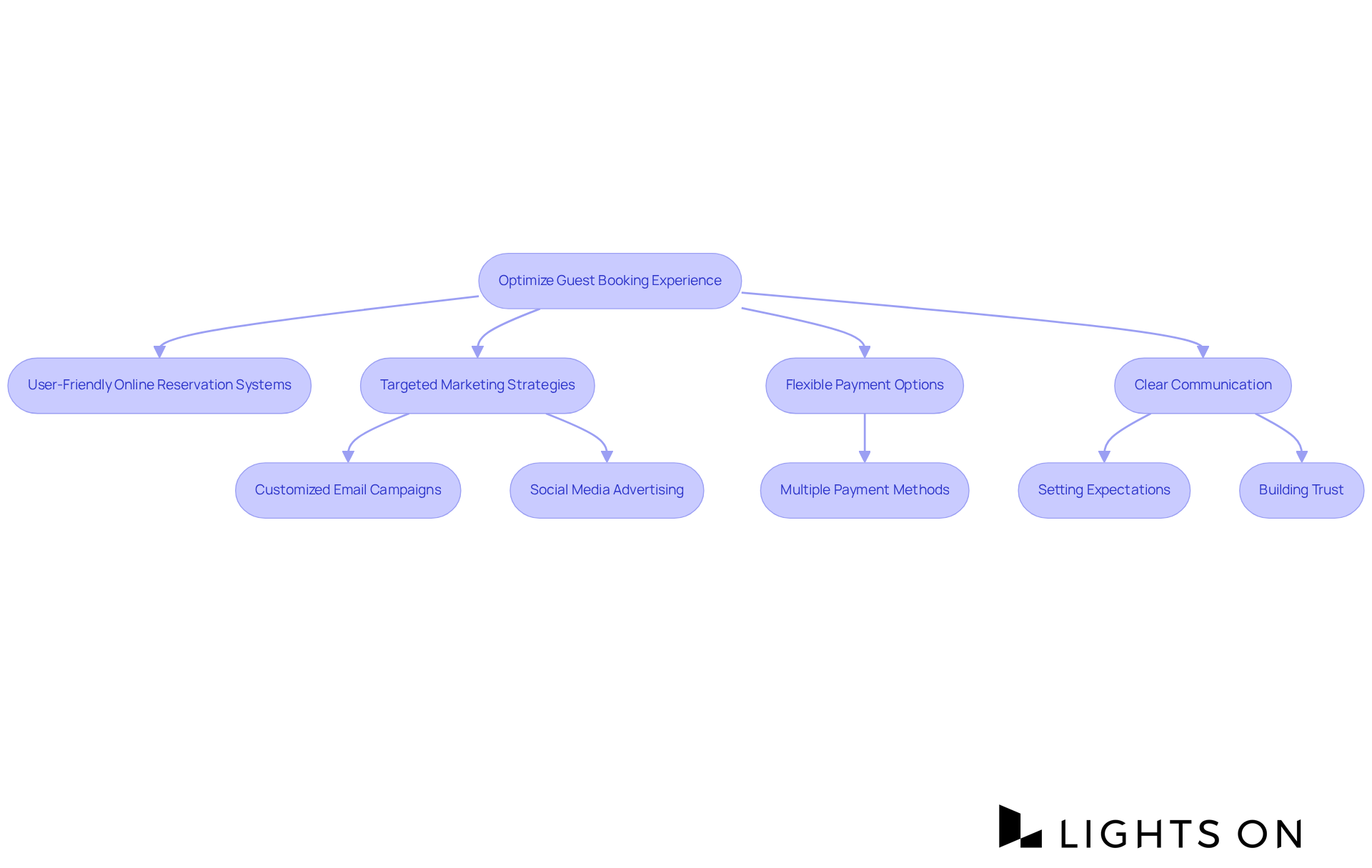
Achieving operational efficiency in accommodations is paramount and can be enhanced through hotel operations consulting that focuses on the strategic implementation of technology solutions to automate routine tasks, streamline workflows, and improve staff communication.
(PMS) are integral to this transformation, empowering establishments to leverage data analytics to pinpoint inefficiencies and identify areas ripe for enhancement. For instance, accommodations that integrate their PMS with reservation systems can reduce overbooking by as much as 30% and increase direct bookings by up to 25%. Furthermore, hotels employing effective PMS solutions can witness a repeat visitor growth of approximately 20%.
This dual advantage not only curtails expenses but also elevates service quality, allowing staff to focus more on client interactions rather than administrative responsibilities. Moreover, the automation of routine tasks, such as housekeeping management and reservation processing, fosters a proactive service approach, ensuring that rooms are meticulously maintained and ready for guests.
AI tools further bolster operational efficiency by automating repetitive tasks and managing frequent visitor inquiries. By prioritizing operational excellence through these technological advancements, hotel operations consulting can play a significant role in enhancing visitor satisfaction while upholding high service standards.
As Jessica Freedman aptly states, "Contemporary accommodation technology doesn't just enhance the visitor experience - it can reduce expenses and promote sustainability objectives.
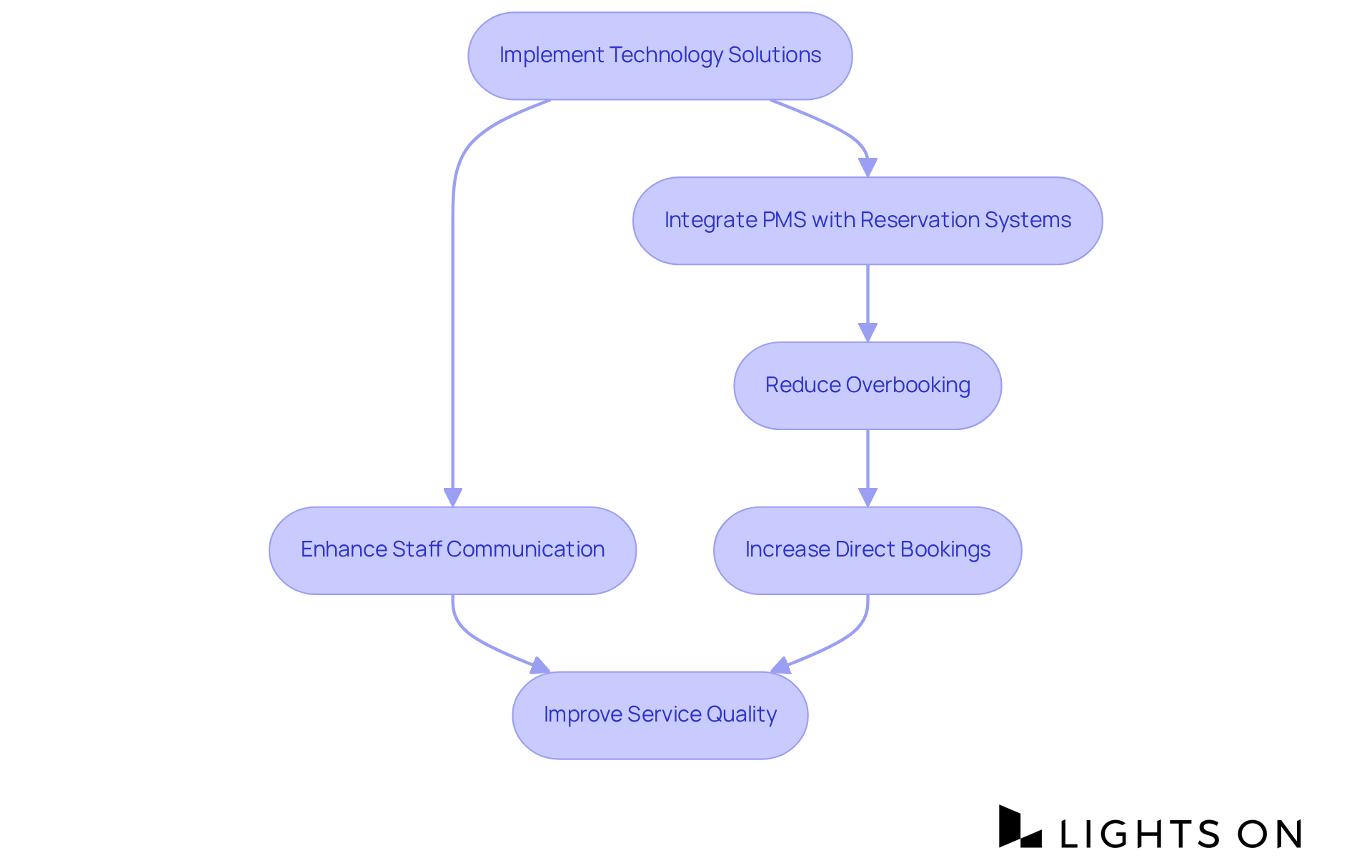
Navigating the complexities of hospitality management requires a profound understanding of industry trends, regulations, and customer expectations. With staffing shortages impacting 68% of hospitality executives, it is essential to leverage industry expertise in to develop effective strategies for addressing these challenges.
Hotel managers can confront staffing shortages by actively engaging in ongoing education and networking within the industry. This approach not only enhances operational flexibility but also fosters innovative solutions to compliance challenges and evolving client preferences. As J. Willard Marriott aptly noted, success in hospitality demands meticulous attention to detail and a steadfast commitment to consistency.
Furthermore, incorporating insights from industry leaders can offer fresh perspectives on overcoming operational hurdles in hotel operations consulting. By prioritizing industry knowledge and seeking mentorship opportunities, managers in the hospitality sector can establish a resilient operational framework that meets the demands of today's dynamic market.
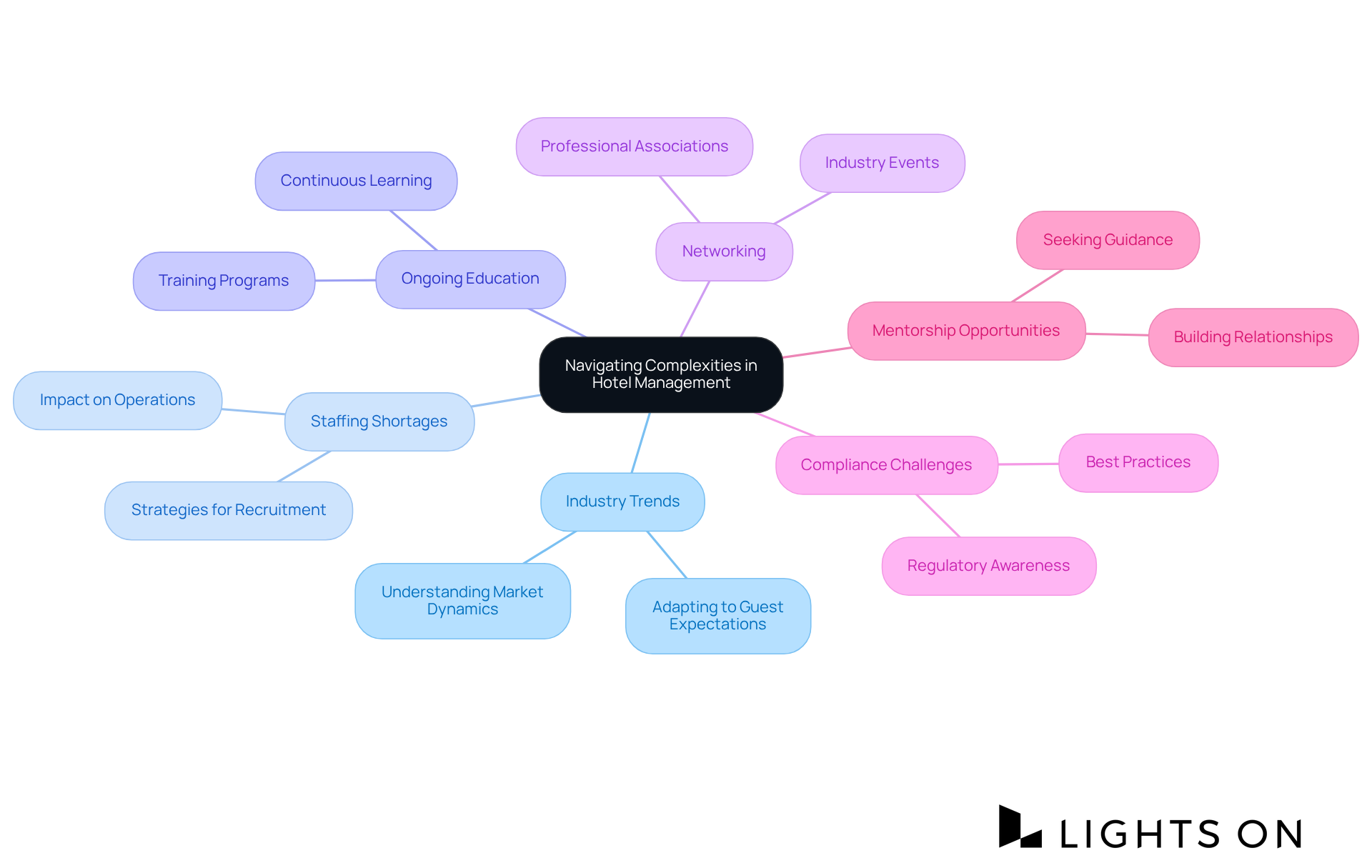
To effectively attract visitors, establishments must adopt that resonate with their specific audience. Here are some key strategies to consider:
Furthermore, as emphasized by Lights On, comprehending the effectiveness of these strategies in attracting visitors is crucial for increasing bookings and optimizing revenue management.
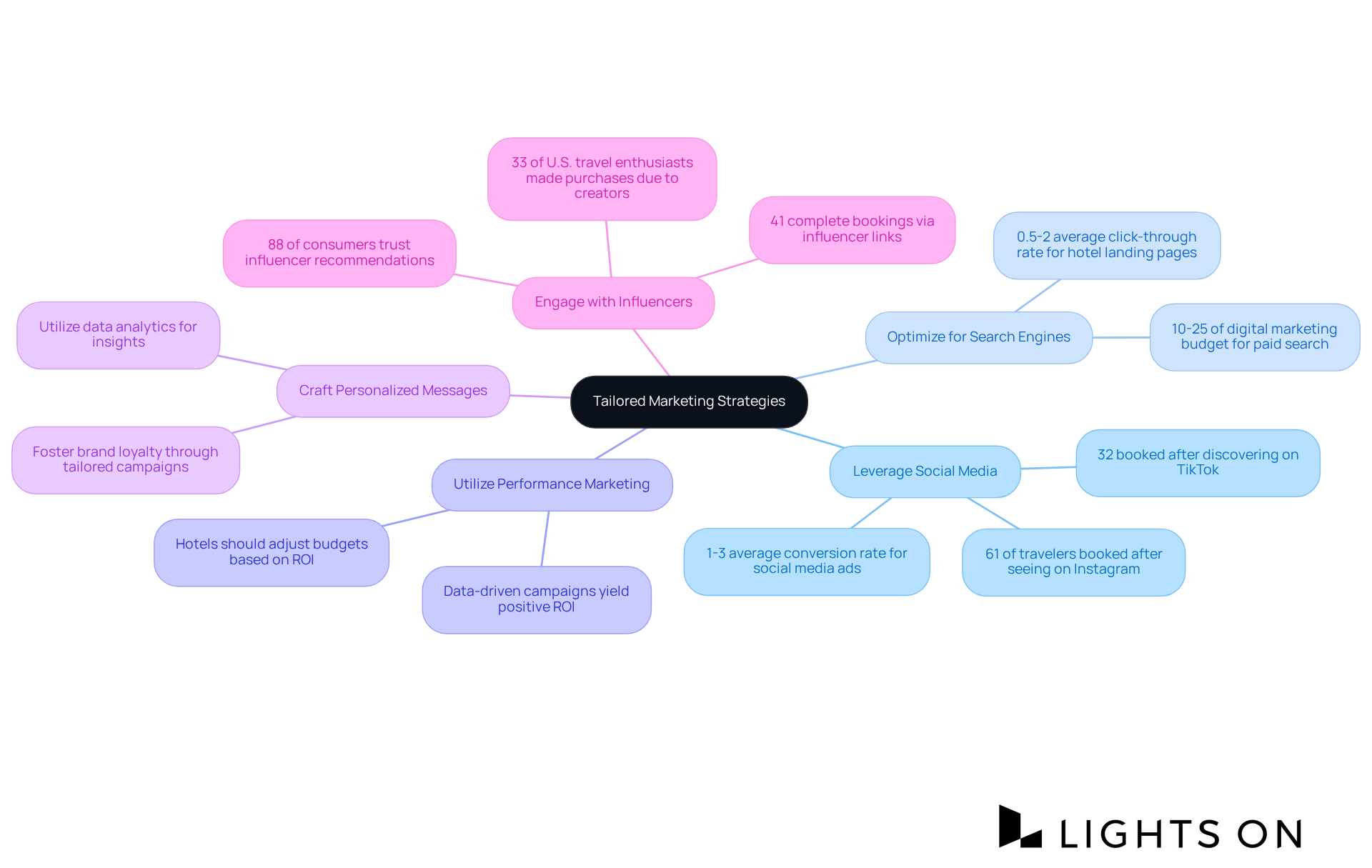
Regular employee training and development programs are essential for maintaining high service standards in accommodations. By equipping employees with vital skills and knowledge, hotels can ensure that staff members are fully prepared to meet visitor expectations. Training should emphasize:
Research indicates that organizations investing in comprehensive employee training experience a significant boost in service quality; well-trained staff contribute to smoother operations and increased guest satisfaction. Furthermore, effective training programs not only elevate service standards but also enhance staff morale and retention rates, fostering a motivated workforce that acts as brand ambassadors. In fact, companies with robust training initiatives report up to 218% higher income per employee compared to those lacking formalized training. Additionally, companies are 17% more productive and 21% more profitable if their employees receive the training they need. This underscores the vital role of in driving operational success and maintaining a competitive edge through hotel operations consulting in the hospitality industry.
As Jessica Freedman states, 'Hotel staff training is one of the cornerstones of hospitality.' Moreover, training in upselling and cross-selling can generate additional revenue for establishments, further emphasizing the importance of investing in employee development. The flexibility offered by online training sessions, which can be attended on weekends or days off, addresses potential time constraints for employees, making training more accessible.
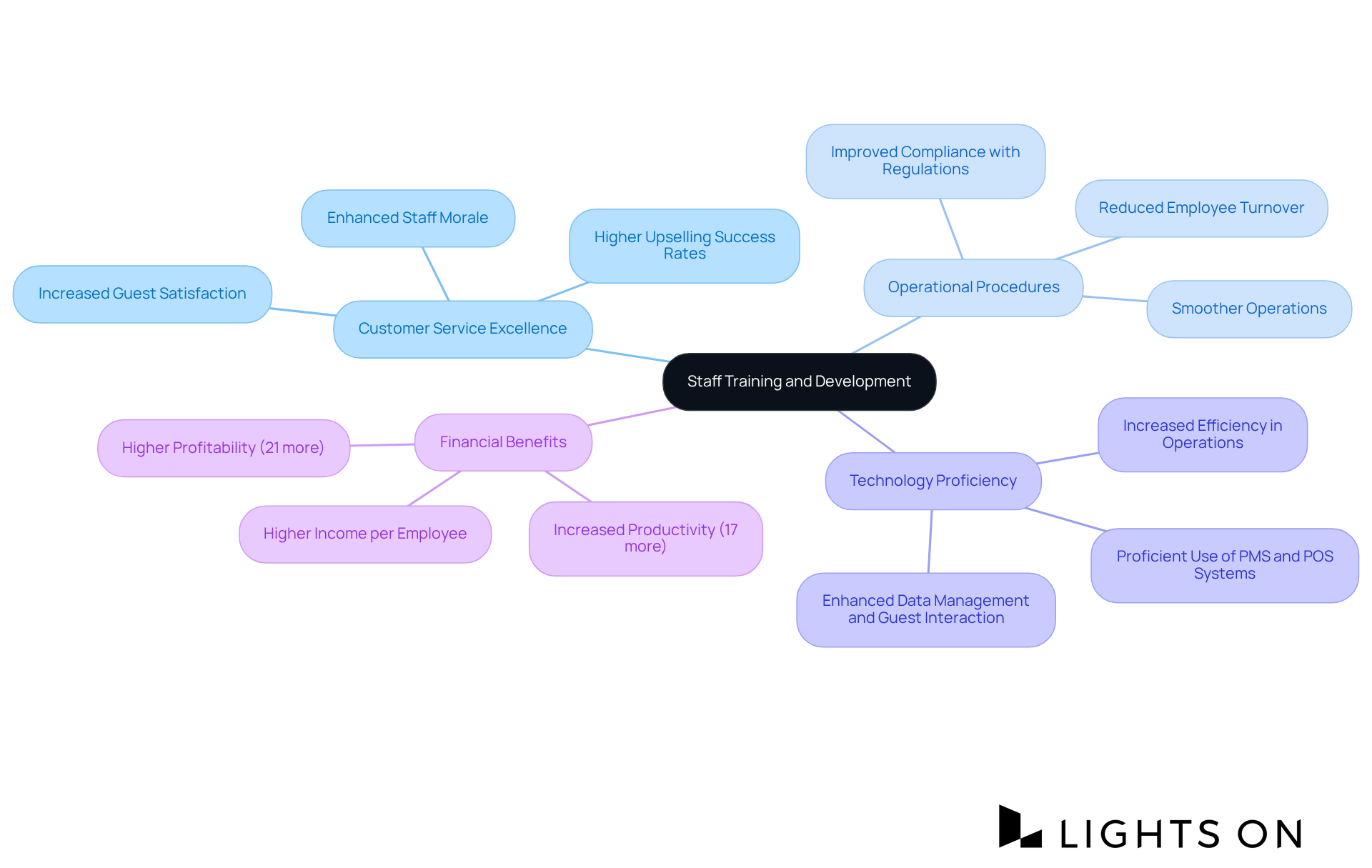
Hotels must implement comprehensive risk management strategies within their hotel operations consulting to identify and mitigate potential operational challenges. This critical approach begins with conducting , which are essential for uncovering vulnerabilities.
Furthermore, developing robust contingency plans ensures that establishments are prepared for unforeseen circumstances, while strict compliance with safety regulations safeguards both operations and reputation. By proactively addressing risks, hotel operations consulting can assist hotels in protecting their operational integrity and ensuring a safe environment for visitors and staff alike.
This commitment to safety and preparedness ultimately fosters trust and loyalty among guests, reinforcing the establishment's standing in the competitive hospitality landscape.
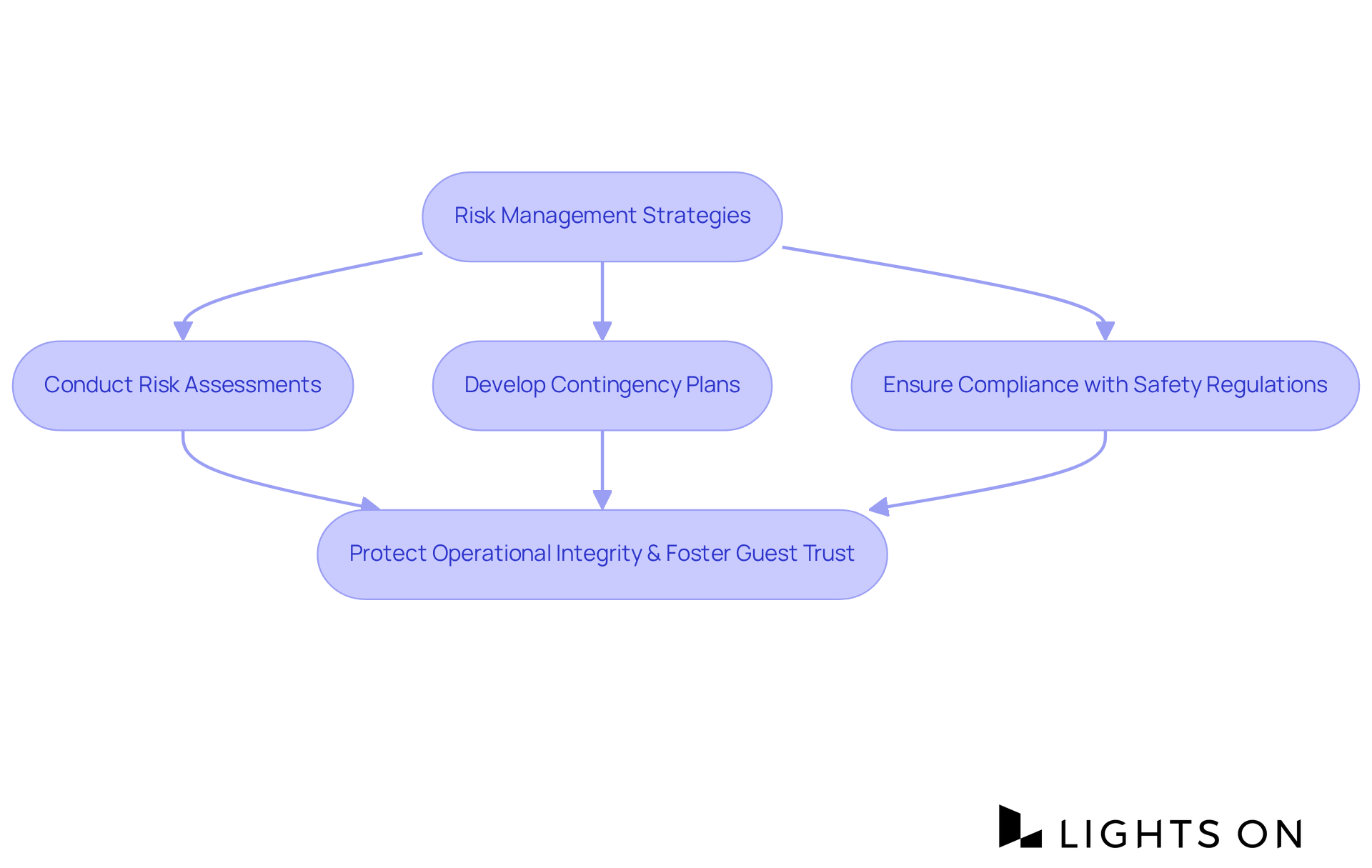
Establishing strong customer feedback systems is crucial for establishments aiming to enhance visitor experiences and service quality. By utilizing surveys, online feedback, and direct communication, accommodations can pinpoint specific areas for improvement and swiftly address visitor concerns.
Consider this:
Consistently evaluating feedback not only drives service improvements but also cultivates a culture of ongoing enhancement, ensuring that establishments remain agile and responsive to evolving client needs. Furthermore, favorable responses to follow-up surveys indicate successful improvements, while continuous feedback collection reinforces an establishment's commitment to customer satisfaction.
This proactive approach is vital in a competitive landscape, where
By effectively leveraging these insights, accommodations can implement meaningful changes that resonate with guests and align with industry trends. However, it is imperative to acknowledge the challenges posed by negative reviews, as
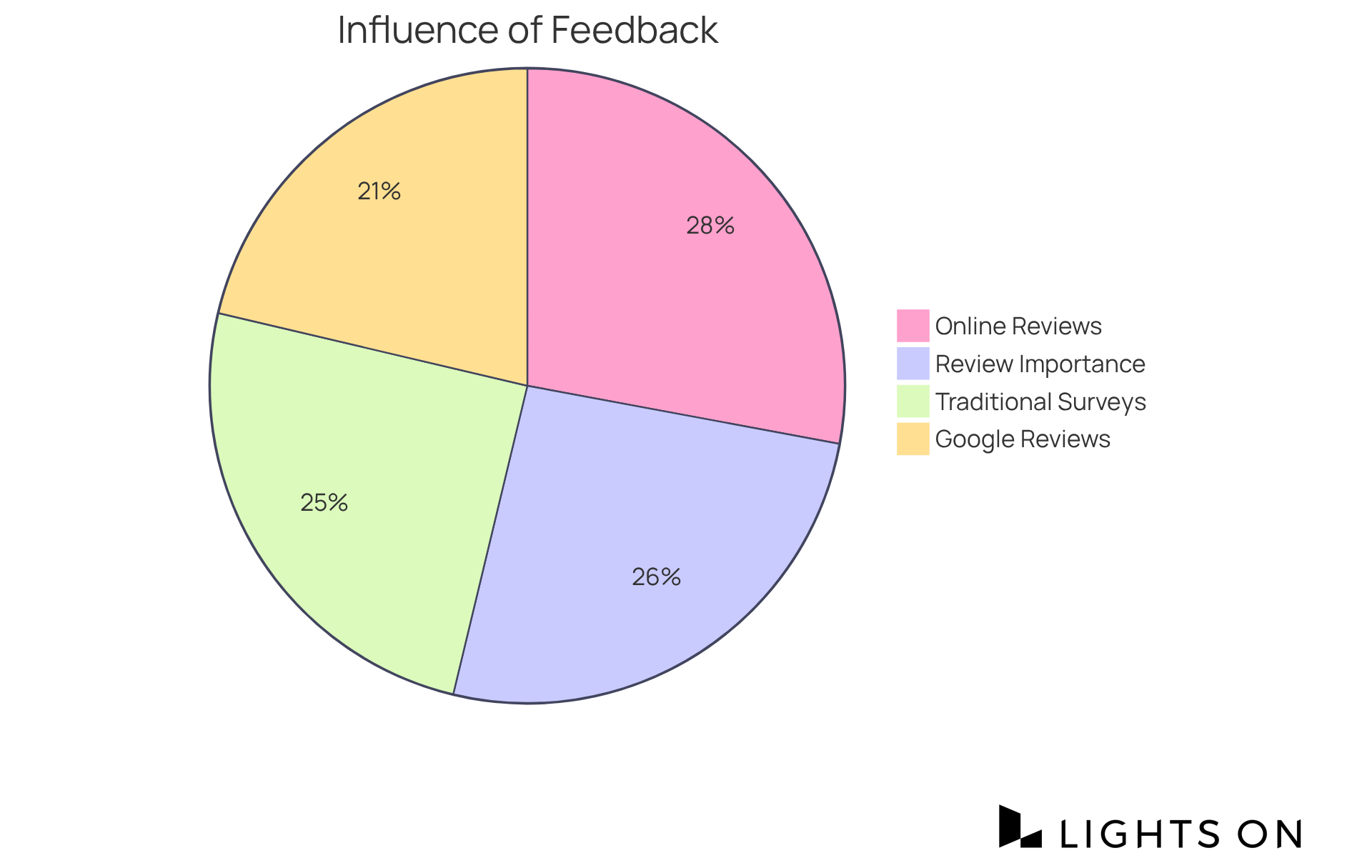
Strategic collaborations with local enterprises, technology suppliers, and service vendors are essential for enhancing hotel operations consulting and improving a lodging's service offerings. These partnerships not only elevate visitor experiences but also drive operational efficiency and expand market reach. By leveraging the unique strengths of their partners, hotels can craft distinctive value propositions that resonate with guests and differentiate them in a competitive landscape. For example, luxury properties that partner with local farms and chefs create authentic culinary experiences, showcasing regional flavors through exclusive tasting menus and seasonal food festivals. Such initiatives enrich the dining experience and foster deeper connections with the local community.
Furthermore, hotel operations consulting can help in integrating technology through partnerships to streamline operations and enhance visitor interactions. Hotels utilizing AI-driven concierge services and mobile applications significantly improve the visitor experience by offering tailored recommendations and seamless communication. This technological integration is crucial, as 65% of hoteliers believe that hotel operations consulting can help in implementing faster, fully integrated systems that could unlock substantial additional revenue.
The benefits of extend beyond operational enhancements; they cultivate a sense of community and authenticity that visitors increasingly seek. By collaborating with local artisans, wellness professionals, and cultural organizations, accommodations can deliver unique experiences that embody the local culture and elevate visitor satisfaction. As noted by industry leaders, fostering these collaborations not only enriches the guest experience but also strengthens the hotel's brand and market position, ultimately leading to increased loyalty and repeat business.
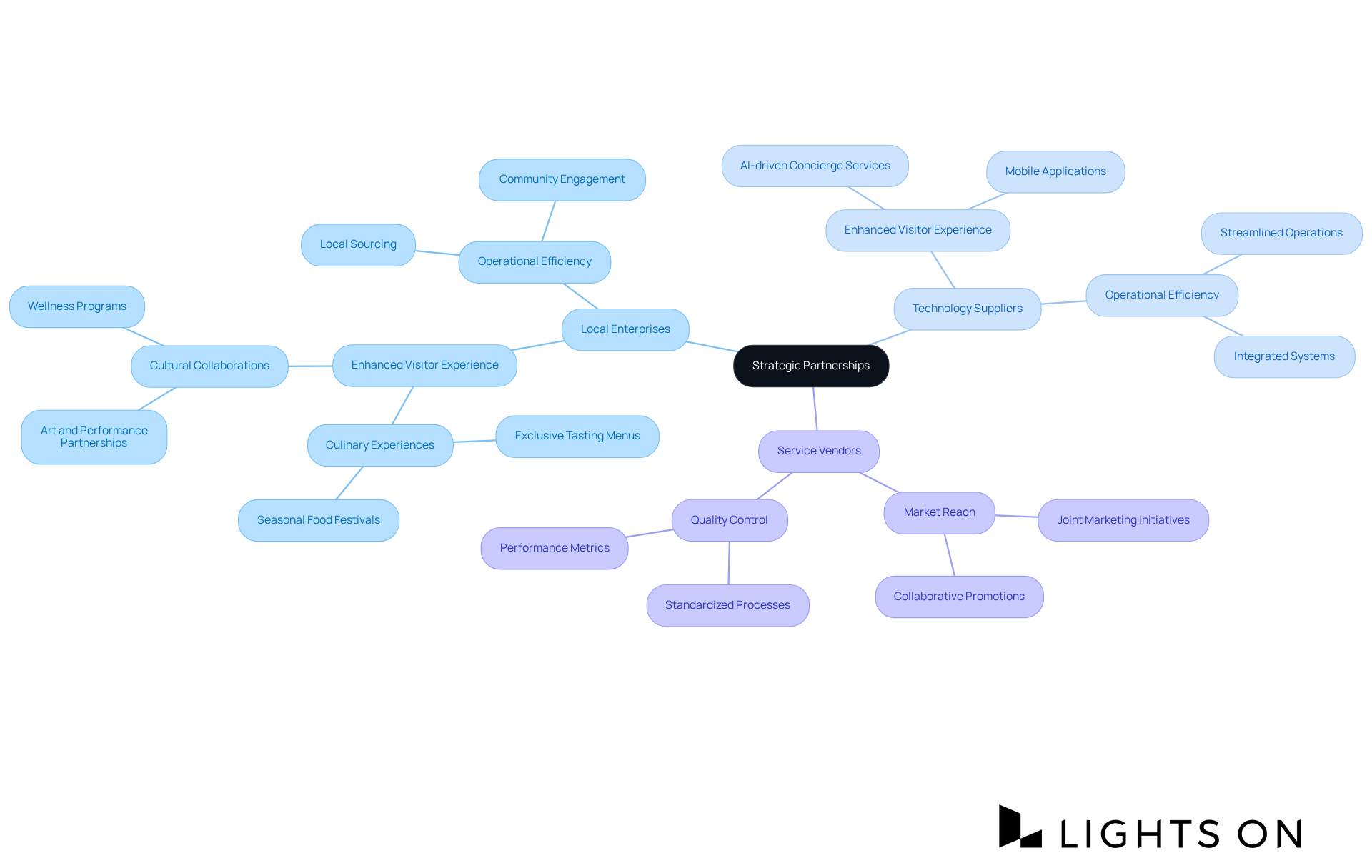
Effective hotel operations consulting is predicated on a multifaceted approach that integrates advanced strategies to enhance profitability, optimize guest experiences, and streamline operational efficiency. By concentrating on critical areas such as revenue management, data-driven decision-making, and tailored marketing, hotels can strategically position themselves to thrive in a competitive landscape. The insights provided throughout this article underscore the necessity of adopting a comprehensive strategy that aligns with contemporary market demands.
Key points discussed include:
Each of these elements contributes to a holistic framework that not only addresses current industry complexities but also prepares hotels for future growth.
In conclusion, the hospitality industry stands at a pivotal juncture where embracing innovative practices is crucial for sustained success. By prioritizing operational excellence and customer satisfaction, hotels can foster loyalty and drive revenue. The strategies outlined serve as a call to action for hotel managers and operators to invest in their operations consulting efforts, ensuring they remain agile and competitive in an ever-evolving market. Embracing these best practices will not only enhance operational capabilities but also create memorable experiences that resonate with guests, ultimately securing a thriving future for the hospitality sector.
What is the focus of Lights On in hotel operations?
Lights On focuses on advanced revenue management techniques that emphasize pricing optimization and demand generation, supported by effective accommodation marketing strategies.
How do properties benefit from adopting these revenue management strategies?
Properties that adopt these strategies can dynamically adjust their pricing based on market trends and consumer behavior, leading to occupancy rate increases of up to 15%.
What role does data analytics play in hotel operations?
Data analytics helps accommodations uncover insights into visitor preferences, booking habits, and operational performance, enabling informed decision-making that enhances service delivery and efficiency.
What key performance indicators (KPIs) can accommodations monitor using data management systems?
Accommodations can monitor KPIs such as occupancy rates, average daily rates, and guest satisfaction scores.
How can effective marketing strategies impact hotel bookings?
Effective marketing strategies, such as targeted email campaigns and social media promotions, can significantly elevate bookings by reaching the right audience with tailored promotions.
What are some ways hotels can enhance customer satisfaction through booking experiences?
Hotels can enhance customer satisfaction by optimizing online reservation systems, implementing targeted marketing strategies, offering flexible payment options, and maintaining clear communication throughout the reservation process.
Why is a seamless reservation experience important for guest loyalty?
A seamless reservation experience is crucial because 72% of travelers prioritize superior guest review ratings over brand reputation or lower rates when selecting accommodations, which encourages repeat visits.
What does investing in an optimized booking process represent for hotels?
Investing in an optimized booking process represents a strategic move that fosters lasting customer relationships and enhances financial performance through improved hotel operations.
Transform your group booking strategies with Lights On and watch your occupancy soar.